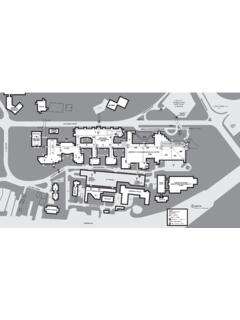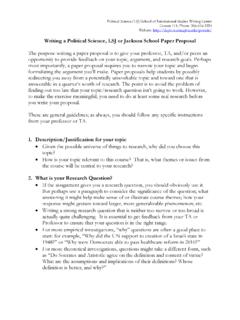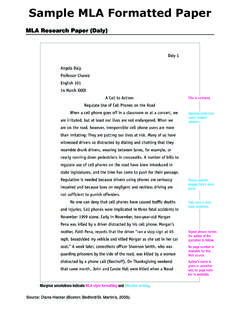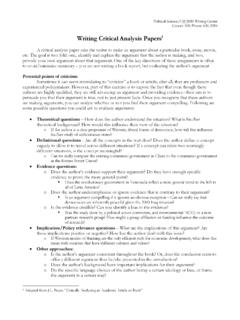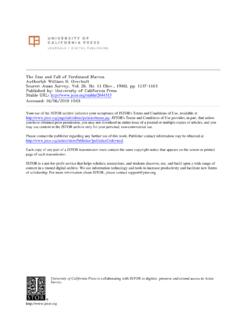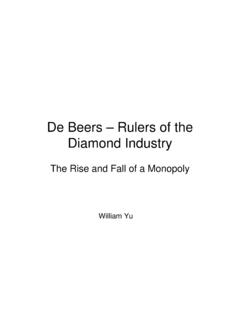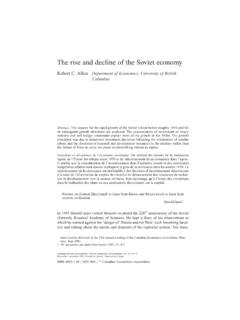Transcription of The Rise and Fall of British Fascism: Sir Oswald Mosley ...
1 323 intersections online Volume 11, Number 2 (Autumn 2010) Bret Rubin, The Rise and fall of British fascism : Sir Oswald Mosley and the British union of fascists , intersections 11, no. 2 (2010): 323-380. ABSTRACT Modern connotations of " fascism " in mainstream Western society are unflinchingly negative, heavily associated with the historical regimes of Mussolini and Hitler begun before the Second World War. It seems impossible to believe that the people of such an entrenched democratic country as Great Britain could ever harbor mainstream fascist leanings. However, fascism was not always such a vilified ideology in the West.
2 In the late 1920s and 1930s in Great Britain, fascism was often admired by the public. During Britain's deep economic depression, many pointed to emerging autocracies in Italy and Germany as powerful new examples of effective modern government. The celebrated young British Member of Parliament Oswald Mosley became especially enamored of this new ideology in the early 1930s. Mosley created the British union of fascists as a vehicle for his economic vision of Britain as a Keynesian economic state, with an emphasis on deficit spending. After a period of initial popularity, his movement eventually became a haven for lunatic anti-Semites and fringe members of society.
3 As Mosley became lost within the monster he created, frequent public violence at his group's rallies made him a national pariah. The impact of Mosley and his British union of fascists on British attitudes towards fascism cannot be underestimated. While it would seem that fascism 's unpopularity was brought on by external forces, it was really Mosley 's movement on the home front that initially turned the British public against the ideology. It was Oswald Mosley , not Hitler or Mussolini, who did the most to ensure Britain remained a free democracy and never succumbed to fascism . Fair Use Notice: The images within this article are provided for educational and informational purposes.
4 They are being made available in an effort to advance the understanding of scientific, environmental, economic, social justice and human rights issues etc. It is believed that this constitutes a 'fair use' of any such copyrighted material as provided for in section 107 of the US Copyright Law. In accordance with Title 17 Section 107, the material on this site is distributed without profit to those who have an interest in using the included information for research and educational purposes. intersections Autumn 2010 324 The Rise and fall of British fascism Sir Oswald Mosley and the British union of fascists By Bret Rubin Princeton University efore Sir Oswald Mosley , British fascism was nearly invisible, limited to a handful of radicals, and widely considered by Britons as a foreign phenomenon.
5 The earliest fascist groups in the United Kingdom were simple imitations of Mussolini s Partito Nazionale Fascista. Rotha Linton-Orman founded the first of these groups, the British Fascisti, in Splinter groups quickly broke away, including the National Fascisti in 1924 and the Imperial Fascist League in Lacking a coherent ideology, and with membership in the dozens, their actions were limited to petty demonstrations and acts of vandalism. These groups received essentially no attention from either the press or the public. As such, British fascism remained limited to the very fringe of society.
6 1 Colin Cross, The fascists in Britain. (New York: St Martin's, 1961), 57. 2 Ibid., 64. B Bret Rubin Sir Oswald Mosley and the British union of fascists 325 When Sir Oswald Mosley founded the British union of fascists (BUF) in 1932, he launched fascism into the British mainstream. As a popular ex-Member of Parliament (MP), he seemed uniquely qualified to carry the unlikely ideology to the fore of British politics. His exceptionally visible career in Parliament from 1918-1931 secured the nation s attention. During this time, Britons widely admired Mosley for his political dexterity and talent for oratory.
7 After having dinner with Mosley in June 1924, famed English socialist author Beatrice Webb declared him the most accomplished speaker in the House [of Commons]. 3 As such, when Mosley announced his formation of a fascist political organization, his decision piqued the interest of the public. For reasons to be discussed, Mosley felt that fascism was the only recourse to save the nation from the economic crisis. Regardless of his reasoning, his decision merited national attention. For the first time, British fascism amounted to more than three old ladies and a couple of office boys, as Mosley put Mosley s movement served to widely publicize fascism as an ideology in Britain.
8 Although the BUF enjoyed brief stints of moderate popular support, the public eventually widely condemned the movement, and this rejection had a significant impact on British attitudes towards fascism in general. Before Mosley and the BUF, the British public saw fascism as a foreign phenomenon existing outside of national concerns. Mosley s movement brought fascism onto British streets and as the public grew more conscious of the BUF, British disinterest gradually evolved into outright revulsion. Sir Oswald Mosley and his British union of fascists created the negative connotation of fascism that was solidified by the Second World War.
9 As such, British negative perceptions of fascism began not with events in Germany or Italy, but at home. Although initially received as a benign curiosity, significant opposition against the BUF soon mobilized from a variety of sources. As the tide of public opinion began to sway against him, Mosley s politics grew increasingly radical and polemic. By 1937, he was a national enemy. His transformation from a widely admired bright young politician to a national pariah had a powerful impact on British attitudes towards fascism . As Mosley increasingly alienated his nation, he destroyed the credibility of fascism as an ideology.
10 3 Beatrice Webb, Norman Ian MacKenzie, and Jeanne MacKenzie, The diary of Beatrice Webb, Volume Four 1924-1943, The Wheels of Life (Cambridge: Belknap, 1985), 20. 4 Robert Jacob Alexander Skidelsky, Oswald Mosley (London: Macmillan, 1975), 291. intersections Autumn 2010 326 I. Beginnings: fascism and Oswald Mosley , 1922-1932 n the 1920s, British attitudes considered the new Italian ideology to be nothing noteworthy. Coverage of the Mussolini s rise by the British press was mixed, ranging from a complete lack of recognition to mild disapproval.



